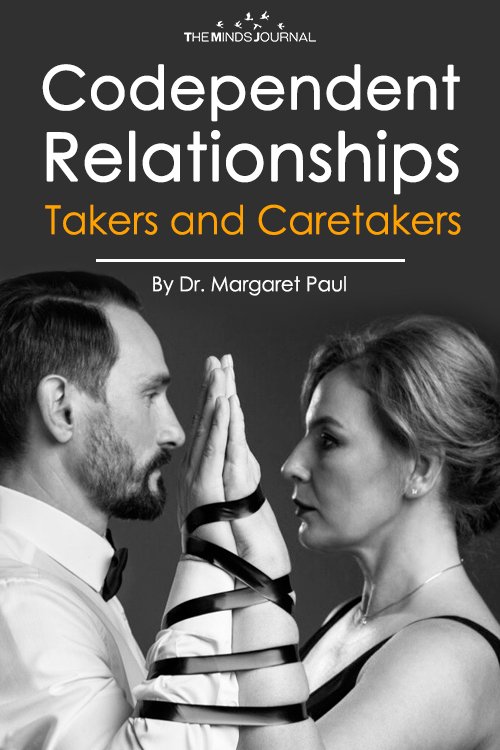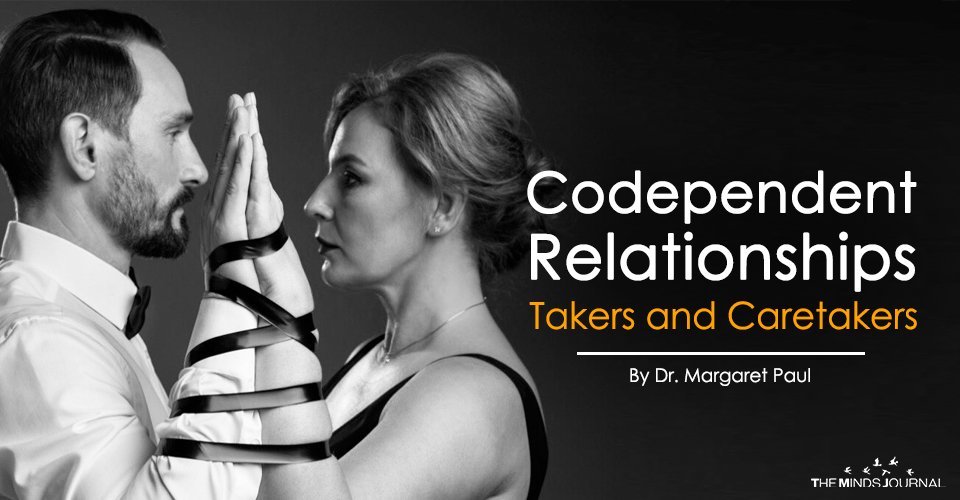Takers and caretakers – they often seem to find each other! As a counselor who has worked with relationships for many years, I can tell you that this is the most frequent relationship dynamic that I encounter.
Takers are people who tend to be narcissistic – that is, they are self-centered with an excessive need for attention and admiration. The taker attempts to control getting love, attention, approval or sex from others with anger, blame, violence, criticism, irritation, righteousness, neediness, invasive touch, invasive energy, incessant talking and/or emotional drama. The taker uses many forms of both overt and covert control to get the attention he or she wants.
Takers not only want a lot of control but are often afraid of being controlled and become overtly or covertly resistant to doing what someone else wants them to do. The taker might resist with denial, defending, procrastination, rebellion, irresponsibility, indifference, withdrawal, deadness, numbness, rigidity, and/or incompetence.
In a relationship, takers operate from the belief that “You are responsible for my feelings of pain and joy. It is your job to make sure that I am okay.”
Caretakers, on the other hand, operate from the belief that “I am responsible for your feelings. When I do it right, you will be happy and then I will receive the approval I need.” Caretakers sacrifice their own needs and want to take care of the needs and wants of others, even when others are capable of doing it themselves. Caretakers give to others from fear rather than love – they give to get.
Neither takers nor caretakers take responsibility for their own feelings and wellbeing. Takers generally attempt to have control over others’ giving them the attention and admiration they want in overt ways, while caretakers attempt to have control over getting approval in more covert ways, such as compliance, doing to much for others, and/or withholding their wants and opinions.
Because neither takers nor caretakers are taking care of themselves, they will each end up feeling angry, resentful, trapped, unappreciated, unseen, unloved, misunderstood, and/or unacknowledged.
I tell my clients that whenever they feel this way in a relationship, it is because they are expecting the other person to give them what they are not giving to themselves. When we are not seeing, valuing, acknowledging, or understanding ourselves, and when we are not attending to our own wants and needs, we will always feel upset when others treat us just like we are treating ourselves.
Codependent relationships – relationships of two takers, two caretakers, or a taker and a caretaker – will always run into problems. Many people leave these relationships, only to discover the same problems in their next relationships. Takers and caretakers can switch places in different relationships and over different issues, but the problems remain the same – anger, resentment, distance, lack of sexuality, boredom, feeling unloved and unloving.
There really is a way to heal this.
Relationships heal when individuals heal. When each partner does their Inner Bonding work, their relationship system heals. When each person learns to take full personal responsibility for his or her own feelings of pain and joy, they stop pulling on each other and blaming each other. When each person learns to fill themselves with love and share that love with each other, instead of always trying to get love, the relationship heals.
Learning how to take 100% responsibility for your own feelings is one of the essential ingredients in creating a healthy relationship. This means learning to be conscious of what you are feeling and being open to learning about what you are doing to create your own feelings (Step 1 of Inner Bonding), instead of being a victim and believing that others are causing your feelings. Your feelings come from how you treat yourself and others, from what you tell yourself and what you believe about yourself and others, rather than from others behavior. Blaming others for your feelings will always lead to major relationship problems.
In reality, you are the only one you actually have control over. You are the only one you can change. Why not start today by taking your eyes off your partner and putting them squarely on yourself? Why not start today with a consistent Inner Bonding practice? Why not join our membership community and receive help and support with your Inner Bonding practice?
Written by Margaret Paul, PhD
For information or to schedule a phone or Skype session: 310-459-1700 • 888-646-6372 (888-6INNERBOND) http://www.innerbonding.com
You may also like
3 Secrets To Achieving Love Without Attachment
Love Without Attachment: Ways To Love Unconditionally
Are You Emotionally Dependent And Not In Love (Here’s how To know)
15 Warning Signs Your Boyfriend Has Major Insecurity Issues
The Reason Why We Tend to Attract Emotionally Unavailable Partners
5 Reasons Why You Get Emotionally Attached Too Soon









Leave a Reply
You must be logged in to post a comment.